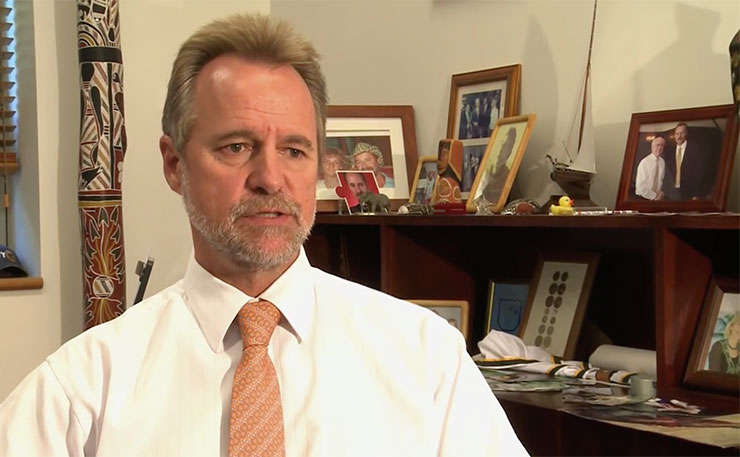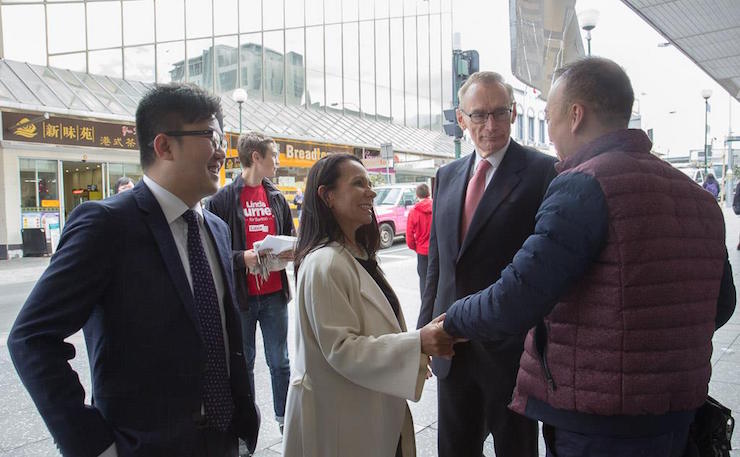The election of Linda Burney is welcome, but the real celebrations can only begin when Labor and the Coalition make significant changes to their Indigenous Affairs policies. Until there is support for a strong and independent First Nations representative body, that’s unlikely to happen, writes Amy McQuire.
In the midst of so much uncertainty, and the re-election of Pauline Hanson, it was understandable that media and pundits alike wanted to celebrate something, anything, on Saturday night. That celebration came in the form of a historic moment, the type that begs for back slapping and warm fuzzy feelings, early on in the marathon election coverage.
Voters may have given a seat (or two possibly) to One Nation, but at least the citizens of the inner-Sydney seat of Barton had provided the night a sorely needed highlight in the form of Wiradjuri woman Linda Burney, the first Indigenous woman to be elected to the federal lower house.
Ms Burney’s election comes following Bill Shorten’s much-publicised promise to get more Aboriginal faces into Parliament. The ALP, at least, was trying to stick to that promise, with the selection of Pat Dodson for the outgoing Joe Bullock’s senate seat, and the likely election of Malarndirri McCarthy in the Northern Territory following the resignation of Nova Peris.
The party was also running First Nations candidates in the Western Australian seats of Durack and Swan (contested by Carol Martin and Tammy Solonec).
At least the ALP tried. The Greens, for example, have never selected an Aboriginal candidate to a winnable seat, and although they have by far the most progressive policies in relation to Aboriginal and Torres Strait Islander people, they ran no First Nations candidates this election.
But despite this, it’s hard not to feel underwhelmed by these moments in history. ‘Firsts’ are not notable in my book, because they could likely be an aberration, an exception to the rule. It’s always more important to celebrate those who come ‘second’, because it means maybe the ceiling has been completely shattered, rather than cracked and re-sealed.
The election of Linda Burney was celebrated across the country, by blackfellas and whitefellas alike, and while it’s great to see more black faces in Parliament, especially in the form of a politician who has honed her skills for years in state parliament, it shouldn’t let the ALP off the hook in relation to Aboriginal affairs.
Having an Aboriginal member in Parliament, and likely two in the Senate, doesn’t mean the ALP have the best wishes of mob at heart. It means that whenever they try and pass legislation to the detriment of mob, they can do it with first prefacing that they were the first party to have an Aboriginal woman in the lower house and the senate. It gives them a false legitimacy on Aboriginal affairs, a badge they can wear that they haven’t earned.
This is what the Liberals did repeatedly with Ken Wyatt, and the ALP to an extent with Nova Peris. But the ALP are still the party that first recommended the abolition of the last robust Aboriginal representative structure ATSIC, the party that continued the NT intervention, the party that continued the destruction of CDEP jobs program and replaced it with the horrendous RJCP, the party that apologised for the Stolen Generations but then saw an exponential rise in the number of Aboriginal children being taken from their families, the party that completely bungled the intervention’s $1 billion housing programme SIHIP with disastrous consequences, the party that made Aboriginal people sign over their land in exchange for government funds that are the right of any other Australian citizen, and the party that set up the National Congress of Australia’s First Peoples to falter in the first place. The party that committed to the Close the Gap targets and then lost office as that gap continued to widen.

Of course, the Coalition is not much better. In fact, you could argue they have been catastrophically worse under current Indigenous Affairs Minister Nigel Scullion. The dangerous bipartisanship on Aboriginal affairs from both major parties has not helped blackfellas, regardless of how many of us you put in Parliament.
It’s nice to have something to celebrate for once, and having more blackfellas in Parliament is of course, better than nothing. But even that comes with caveats.
The great thing with having a politician with experience, is that you can also judge them by their record, rather than their Aboriginality. In Aboriginal communities today, one of the most pressing issues is the spiralling rates of child removal – the rates of Aboriginal children being ripped from their families has risen every year since the apology.
Linda Burney was NSW Minister for Community Services from 2008-2011. In that time, the rates of Aboriginal child removal continued at growing rates in the state. As University of Technology Sydney (UTS) Jumbunna Indigenous House of Learning researcher Paddy Gibson puts it:
“During her time as Minister the number of Aboriginal children in ‘out of home care’ in NSW increased from approximately 4,300 – 5,800. Over the same period, the proportion of Aboriginal children placed with Aboriginal relatives or kin declined from 58 per cent to 50 per cent,” Mr Gibson says.
This is important, because you can’t solve the crisis in Aboriginal communities while continuing the breakdown of the Aboriginal family – this breakdown is the reason there are so many seemingly intractable problems today. Children who are placed in out-of-home care are more likely to end up in juvenile detention, and then jail, who continue the cycle because parents who are in jail are more likely to have their children taken by ‘child protection’.
Of course, Linda Burney wasn’t elected to represent Aboriginal Australia, she was elected to represent Barton. It’s not a win for Aboriginal representation in Parliament. What would be a win, would be for both major parties to support a robust, democratically elected national Aboriginal body that cannot be dismantled based on the political whims of the day.
Given the sorry history both parties have in this arena, we may be waiting a long time for that to eventuate.
Donate To New Matilda
New Matilda is a small, independent media outlet. We survive through reader contributions, and never losing a lawsuit. If you got something from this article, giving something back helps us to continue speaking truth to power. Every little bit counts.





